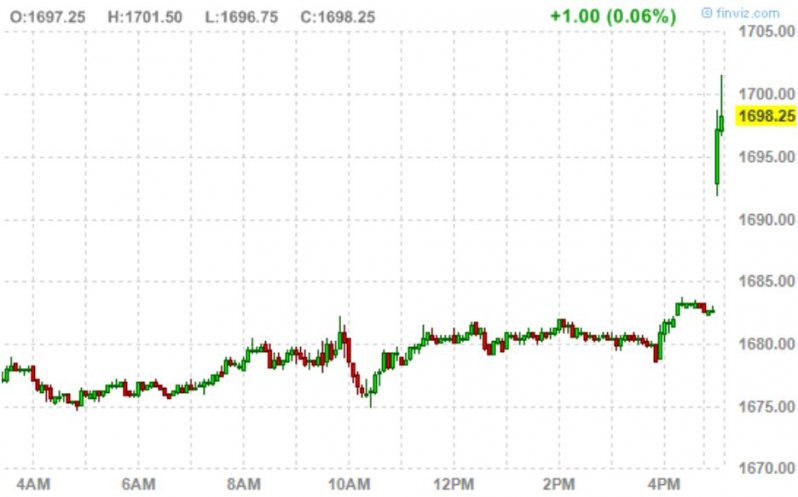The pixels were barely dry on my regular weekly preview before we got news that Larry Summers had withdrawn from consideration. Here is what I wrote yesterday, reproduced here to illustrate the background that everyone should have known:
"Who will be the next Fed Chair? Given the apparent nominees, does it really matter for the market? The latest word shows opposition from key Democrats to a Summers nomination. Prof. Hamilton explains why most economists favor Yellen. Michael Hirsh of The Atlantic produces The Comprehensive Case Against Larry Summers."
I want to consider the news from four perspectives: the market, the policy issues facing a new Fed Chair, the needed skills, and some political implications.
The Market
Stock futures are up over 1% from where they were trading before the news. I track real-time quotes at the CME Group site, but Business Insider has a chart that better illustrates the Summers effect. Futures were already up a touch on the continued positive news from Syria, but you have to attribute another 1% or so to Summers.
For those scoring at home, the S&P index covers $1.6 trillion in market cap and there is another $5 trillion benchmarked to the index. This means that a one percent move is over $70 billion, but that is an underbid. Other markets move in tandem, including smaller cap stocks in the US as well as other world markets. For our purposes it is enough to say that the effect on worldwide wealth exceeds $100 billion.
This is amazing when you consider the following:
- Summers never actually held the post or set any policies;
- His nomination always faced a rough path from Republicans, with a 60% Senate hurdle looming; and most importantly
- His policies concerning stimulus were unlikely to be very different from the other leading candidate, Janet Yellen.
CNBC's Steve Liesman (@steveliesman) tweeted:
"Having (wrongly) convinced itself Summers would be more hawkish than Yellen, market now rallies off its false assumption."
That sums it up very well. It is a good lesson for most investors, who should be focused on fundamentals, letting the traders eventually figure it out.
The Policy Issues
The new Fed Chair will face an unprecedented policy challenge: Unwinding the massive Fed balance sheet.
There is tremendous skepticism about whether this can be accomplished without major economic distortions. Even the most cursory summary of choices includes the following:
- Ending new purchases of assets
- Ending the replacement purchase of maturing assets – the runoff approach
- A gradual sale of existing holdings
- A more rapid liquidation of existing holdings.
While current Fed statements lean toward the top of this continuum, things could change. If banks reduced their current preference for excess reserves, accelerating their lending, the Fed would need to reduce the balance sheet rather quickly. Bernanke frequently claimed that this could be done very quickly and with modest effect. (I agree, since the secondary market for these securities is large). It will now be someone else's problem.
The Needed Skills
Leadership style and skills from the Fed Chair have varied over time. For this brief update, I will highlight the contrast between Greenspan and Bernanke.
As background, readers should understand that the Fed includes both the Governors and the regional Fed Presidents. The Governors are all FOMC voting members. The NY Fed President is always a voting member. The other regional Presidents participate, but voting participation rotates. The regional Presidents are generally more conservative (hawkish) than the Governors.
- Greenspan ran a tight ship. New Fed Governors were expected to learn the ropes and to stay on message in public comments. Dissent was low. I wrote about this seven years ago.
- Bernanke is more tolerant of dissent – part of the process of building consensus.
- Bernanke was the right person for the crisis. His professional background included emphasis on the mistakes from the depression.
- Bernanke was a highly-respected academic -- prized credentials at the Fed. It is important to command respect and his background gave him a flying start.
The new Fed Chair will still need the consensus-building skills, but the internal dynamics will be quite different. If Janet Yellen is the choice, she will have credibility both from her academic and policy credentials. She starts with a strong relationship with colleagues.
Unnoted by many is her role as head of the Fed's communication initiatives. This could be an important wildcard as the Fed changes course.
The Politics
We can expect to see an emphasis on political commentary. Media types love to talk about personalities. It is something that requires no background knowledge and no particular expertise. It is a way for everyone trying to sell something to grab a piece of the media.
The FT's Cardiff Garcia (@cardiffgarcia) tweeted, "Checking my inbox and yep, here come all the sell-siders posing as politics experts."
Here is a brief political guide with an emphasis on relevance for investors. I am trying to convey conclusions, and I'll try to expand this if people have questions.
- The President gets to make appointments that reflect his policy views. Bernanke is a Republican, appointed by a Republican president. He earned re-nomination by Obama, just as Greenspan earned bipartisan support.
- Bernanke's chief competition when he was originally appointed was Glenn Hubbard. He is Dean of the Columbia Business School, and has a distinguished record with a conservative lean. He advised Romney in 2012. He refused to join the partisan Fed bashing. Had he been appointed, his policies probably would have been similar to Bernanke's.
- Summers might have withdrawn to spare himself embarrassment and there might have been consultation. Since there was no official appointment, it is all speculation.
- Obama probably wants a dependable and loyal ally, as would anyone. He has emphasized Clinton-era experts, sometimes creating a confusing panel when he needed clarity. He seems to have a flair for sorting this out. The remaining candidate from the camp of the allies is Geithner. He would be another tough confirmation for many reasons.
- There will be speculation about whether this "injures" Obama and his ability to implement his remaining agenda. There are plenty of doubts about what can be accomplished in his second term, but I do not see this as having a major effect.
This news brings the market closer to fundamental values. The likely nominee is highly-regarded by those with the most expertise.
The contrary viewpoint is most frequently represented by those who want to abolish the Fed. This may be an attractive political argument for some candidates and office-holders, but it is not very relevant for investors.

